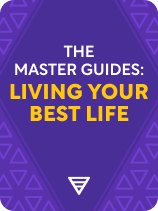

This article is an excerpt from the Shortform book guide to "The Master Guides: Living Your Best Life" by Shortform. Shortform has the world's best summaries and analyses of books you should be reading.
Like this article? Sign up for a free trial here.
Do you feel like you’re stuck in the wrong life? What’s the key to living your best life?
Many authors have tackled why people feel so unhappy with their lives. While they all take different approaches, they seem to agree on one thing: knowing your values and living in alignment with them will make you feel satisfied with your life.
Below we’ll look at how to live your best life by comparing experts’ advice.
Part 1: Why Aren’t You Living Your Best Life?
In order to learn how to live your best life, you need to know why you might struggle to feel satisfied with your life. According to multiple authors, many people feel unsatisfied with the direction their lives are moving in because they’re not clear about their values.
According to former Vedic monk Jay Shetty (Think Like a Monk), your values are the core beliefs that you choose to live by—they determine who you want to be and how you treat yourself and others. They shape how you think, color your perceptions, motivate your behavior, and guide your decisions. In sum, your values determine who you are and what you need to feel happy.
How Values Impact Happiness
Shetty claims that values allow you to understand the meaning underlying everything you do—the degree to which you live in alignment with your values determines how meaningful your life experiences feel to you.
In Designing Your Life, Stanford professors Bill Burnett and Dave Evans put it this way: Satisfaction comes from living coherently—it’s easy to find meaning in what you do and feel good about the direction of your life when your priorities and behaviors are aligned. On the other hand, when your actions and goals don’t reflect what’s important to you, you’re more likely to feel internal conflict that hinders your ability to feel good about what you’re doing.
Why Your Current Values Aren’t Making You Happy
You might feel that you are living your values, but still feel unhappy with your life—why is that? In 101 Essays That Will Change the Way You Think, poet Brianna Wiest suggests that you’re likely living according to values that aren’t actually yours. According to her, you never consciously chose your beliefs and values. Rather, you subconsciously adopted the beliefs and values of your family, your friends, and your culture.
She explains that these adopted beliefs and values influence your entire worldview: how you judge the world, your place in it, and the circumstances you face. In other words, everything you’ve ever thought of as good, bad, right, wrong, beautiful, or ugly has simply been a reflection of the way other people have influenced you.
Maxwell Maltz (Psycho-Cybernetics) explains it like this: You’ve been “hypnotized” by others’ words throughout your life. As a young child, you were impressionable and prone to believing what others said about who you are and what beliefs you should live by. You accepted their opinions and beliefs about you as truth and this shaped your self-image and values in the early part of your life.
Why You Adopt Others’ Values—Even If They Make You Unhappy
Multiple authors, including Wiest, Maltz, and Shetty suggest that the compulsion to adopt others’ values as your own comes from the need for external validation. This need was conditioned in you early on in life when you likely found that conforming to the expectations of other people was the only way you could experience comfort and happiness:
- If you acted according to their desires and expectations, you were rewarded—for example, with extra attention and affection. This made you feel comfortable and happy.
- If you acted against their desires and expectations, you were punished—for example, with rejection or social humiliation. This made you feel uncomfortable and unhappy.
According to Maltz, your self-image and values have likely evolved since your childhood. However, until you consciously address the thoughts and beliefs that influenced you, they will continue to subconsciously inform your motivations and behaviors. Letting the pursuit of external validation rule your life inevitably leads to unhappiness and dissatisfaction.
Part 2: Clarify What You Want Out of Life
Now that you understand how living out of alignment with your values holds you back from living your best life, let’s explore the first step toward feeling happier: Determining what your values are. To achieve this, accept yourself as you are, assess how your current beliefs and values make you feel, and explore various approaches to identify what types of experiences make you feel happy and satisfied.
1) Accept Yourself
The first step toward clarifying what you want out of life is to let go of your need to seek external validation. Pasricha suggests that you can free yourself from the need for validation by accepting who you are and what you need to feel happy. This shift in thinking encourages a cycle of happiness and satisfaction: Self-acceptance inspires you to align your behaviors and decisions with what makes you happy. This alignment encourages positive self-judgment and influences you to make decisions that further increase your happiness.
Furthermore, the more you encourage positive self-judgment, the less time you waste thinking about how others perceive you. This helps you accept yourself exactly as you are and frees you from the pressure of adapting to please or impress others.
2) Assess Your Current Opinions and Beliefs
An important part of accepting yourself and clarifying what you want out of life is assessing whether your current opinions and beliefs align with who you really are or if they only exist to please or impress others. Wiest suggests that you can dissect each of your opinions and beliefs by asking yourself the following four questions:
- When was the first time you came across this idea? For example, you believe that people should not make mistakes. You remember overhearing your parents punishing one of your siblings for making errors on a spelling test.
- How does this idea influence your judgment of yourself, other people, and your experiences? Your belief that people should not make mistakes compels you to be overly critical of yourself and others. It also makes you feel resentful of the experiences that don’t live up to your perfect standards.
- How might adopting opposing ideas impact you? If instead, you choose to believe that it’s okay to make mistakes, you might find it easier to accept and forgive yourself and others for making mistakes. You might also be less inclined to notice mistakes in the first place.
- How would you choose to think about this if your thoughts were already aligned with who you really are? Your aligned self sees mistakes as a valuable part of learning. Therefore, there’s no need to feel critical of yourself or others for making mistakes.
Part 3: Commit to Living Your Values
Now that you’ve identified your values and what you want out of life, let’s explore different ways to start living in alignment with your values and make changes to your life.
1) Set Life Rules
Wiest says you must create life rules that will help you live in alignment with your values. These rules should represent personal commitments that you believe in and that will shape your life in the long term. For example, if you have a life rule to cut ties with people who regularly make you feel bad, you’ll live a life surrounded by positive people who encourage you to be your best self.
Life rules will encourage you to continually live in alignment with your values, and help you overcome barriers that may cause you to stray from your intended path. Living by your rules will ensure that you’re happy and always progressing toward the best version of yourself.
Making rules around all your values might be overwhelming, and having too many values may restrict your ability to commit to the things that are most important. Try choosing the two most important values on your list and prioritizing them, as Brené Brown recommends in Dare to Lead.
2) Align Your Goals With Your True Self
One way to commit to living your values is to choose goals that are important to you, and therefore feel more meaningful than the goals other people expect from you. Focus on the following three areas to set appropriate goals.
- Enjoyable activities
- Innate gifts and talents
- Meditate with your ideal self
3) Establish a Schedule Around Your Values-Based Goals
Nir Eyal (Indistractable) suggests that one way to live better aligned with your values is to build a schedule that helps you prioritize them. This will ensure that you have time for the things that matter to you—which will make your life feel happier and more fulfilling. He recommends creating a schedule around your values in three areas of your life: you, your relationships, and your work.
1) You: Think about who you want to be and the qualities you want to have, and what value-aligned activities you can schedule. For example, if you value “mindfulness,” schedule 15 minutes of gratitude reflection in the morning. If you value “staying healthy,” schedule an hour-long walk every morning.
2) Your relationships: Make time for non-negotiable commitments to your relationships with your family and friends every week. For example, schedule device-free hours with your children every Saturday, a weekly date night with your spouse, and bi-weekly drinks with your group of friends.
3) Your work: Consider areas where you might reprioritize or cut out work tasks that don’t align with what you want to do and who you want to be. For example, if you value “creativity,” allocate time each week for brainstorming and pursuing innovative ideas. If you value “continuous learning,” schedule regular blocks of time for professional development or attending relevant workshops and conferences.

———End of Preview———
Like what you just read? Read the rest of the world's best book summary and analysis of Shortform's "The Master Guides: Living Your Best Life" at Shortform.
Here's what you'll find in our full The Master Guides: Living Your Best Life summary:
- Over a dozen experts' advice on living your best life
- How to understand what's making you feel unhappy
- Actionable steps for living a more meaningful and happy life






